Description
Common use
Citalopram belongs to a class of selective serotonin reuptake inhibitors (SSRIs). This medication is used to treat major depression associated with mood disorders. It is also applied in the treatment of body dysmorphic disorder and anxiety.
Dosage and direction
Take Celexa by mouth with a glass of water, with or without food. Avoid cutting, crushing or chewing this medicine. Do not take the medicine more often than it is prescribed. Do not give up taking it except on the advice of your doctor. It may need time for medicine to help. Consult your doctor concerning the proper dose for you.
Precautions
Before taking Citalopram to tell your doctor or chemist if you are allergic to it; or if you have other allergies. Inform your doctor or chemist if you have bipolar confusion, eye, liver or kidney problems. Aged people can be more sensitive to the side effects of the medicine. During the pregnancy, this treatment should be used only when strongly necessary. As this medicament can be absorbed by skin, women who are pregnant or may become pregnant should not manipulate this medicine.
Contraindications
Celexa should not be used by pregnant/nursing women or children as well as by the patients having demonstrated a reaction of hypersensitivity to Citalopram.
Possible side effect
The most common side effects are quick and irregular pulse, tremor, anxiety, blurred vision, vomiting, fever, diarrhoeia, etc. A very serious allergic reaction rarely occurs. Many people using this medicine do not have serious side effects. Turn to your doctor or pharmacist for more details. In case you notice the effects not listed here, contact your doctor or pharmacist.
Drug interaction
Tell your doctor or pharmacist of all prescription and nonprescription/herbal products you may use before using this medication. Citalopram can interact with: * MAO inhibitors: Furazolidone, Isocarboxazid, Linezolid, Moclobemide Tranylcypromine, etc. * Antiarrhythmic drugs: Propafenone, Quinidine, etc * Serotonin-norepinephrine reuptake inhibitors (SNRIs): Desvenlafaxine, Duloxetine, Milnacipram, Venlafaxine. * Antipsychotics (also called neuroleptics): Fluphenazine, etc. * H2-receptor antagonists: Cimetidine, Ranitidine, Famotidine, Nizatidine, etc. Turn to your doctor or pharmacist for more details.
Missed dose
If you have missed your dose, take it as soon as you remember. If you see that it is near the time for the next dose, skip the missed dose and resume your usual dosing schedule. Do not take your dose twice.
Overdose
If you think you have used too much of this medicine seek emergency medical attention right away. The symptoms of overdose usually include chest pain, nausea, irregular heartbeat, and feeling light-headed or fainting.
Storage
Store your medicines at room temperature between 68-77 degrees F (20-25 degrees C) away from light and moisture. Do not store them in the bathroom. Keep all drugs away from reach of children and pets.



